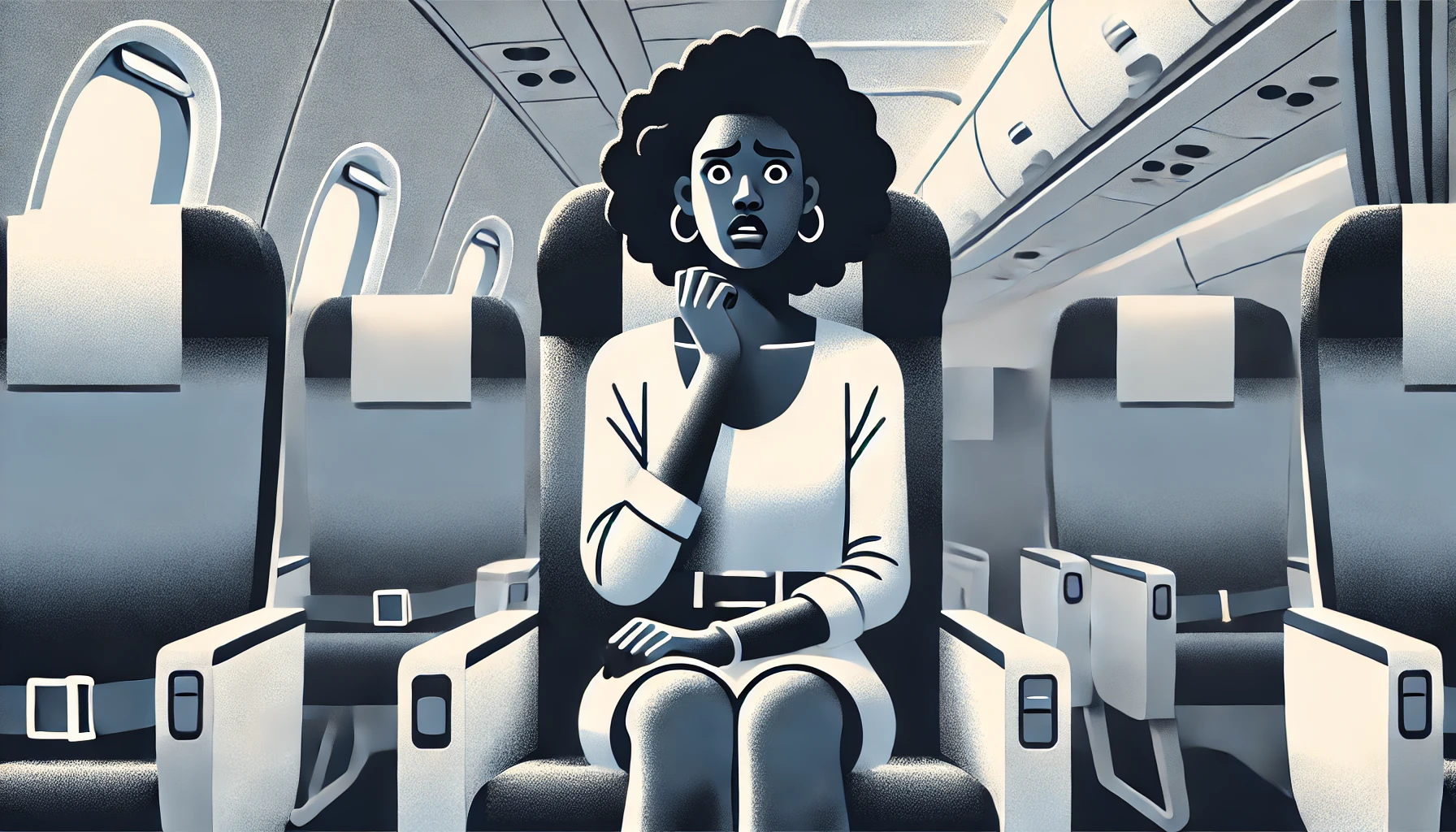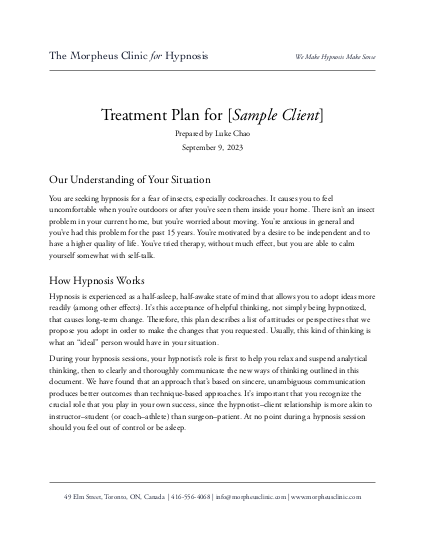![]() I just wanted to drop a line of thanks for the session. It was great of you to outline the session expectations before we got started. I must admit that the session was not what I expected, but I left feeling great. My anxiety with elevators, bridges, and yes, airplanes! has completely disappeared. It was impressive to undergo the realization of where the anxiety stemmed from, but at the same time, I will say that the session has definitely affected other issues in my life that may have came from the same problem (i.e., mistrust of some people/situations).*
I just wanted to drop a line of thanks for the session. It was great of you to outline the session expectations before we got started. I must admit that the session was not what I expected, but I left feeling great. My anxiety with elevators, bridges, and yes, airplanes! has completely disappeared. It was impressive to undergo the realization of where the anxiety stemmed from, but at the same time, I will say that the session has definitely affected other issues in my life that may have came from the same problem (i.e., mistrust of some people/situations).*
![]()
— Lynn (Nurse Practitioner, Toronto)
Had to turn down an amazing promotion because it entailed frequent flying? Dreaming of a vacation and can’t go? Invited to visit relatives abroad and had to decline?
If you suffer from the fear of flying, you are not alone. In fact, one in ten people has this fear. The fear varies in intensity from person to person and can take many different forms. For some people, it can be very difficult to overcome, but its strength differs from one person to another. In all cases, it makes travel difficult or impossible. Even if you manage to fight it and board that plane, it may leave you miserable for the entire vacation.
Depending on how strong the fear of flying is, some people will need a few stiff drinks before boarding a plane, while others are not capable of flying at all. Whether it’s hard or easy to deal with, however, it is not pleasant to live with.
The good news is that you don’t have to.
But before we discuss the solution of overcoming the fear of flying with hypnosis, let’s delve a bit deeper into the problem and discover what it’s made of.

So What is the Fear of Flying?
The fear of flying can be driven by several related fears, such as the fear of heights, the fear of enclosed spaces and the fear of losing control.
Any one of those fears, or a combination of them, can translate into the more specific phobia known as the fear of flying, or aerophobia. Hypnotherapy is very useful in discerning which of them it is, allowing to address the problem at the core. But let’s leave this for later and focus on those three main sources for the fear of flying.
One thing that can be said about all three is that they are very natural human traits. We are hardwired to avoid closed-off, high places from which we can’t get out on our own. These are natural instincts towards self-preservation that have kept the human race from going extinct for millions of years.
Most sane people will avoid standing on a cliff’s edge with no protection. No one will skydive without a parachute, because they understand that is not something you can do twice. The same goes for the fear of enclosed spaces or the fear of losing control. You don’t want to drive a car with no brakes, or climb into a narrow crevice under a pile of rubble. You’d be risking your life, very literally.
The problems start when they manifest themselves into their exaggerated, irrational forms—phobias.
After all, walking a tall bridge is not a problem for most people. The bridge is structurally sound and has a protective railing. Entering a narrow corridor or sitting in an enclosed car compartment should also be perfectly acceptable, and the same goes for riding in the passenger seat in a car driven by a responsible licensed adult.
So why is flying so often a problem?
The answer to this is that unlike driving or walking a bridge, flying is not a very common situation. We simply don’t have many opportunities to get used to it. That, and the fact that the altitudes are extreme, makes it a very uncomfortable thought. Finally, there’s the fact that it often combines all three phobias which has an intensifying irrational effect.

The Conscious and the Unconscious—Connecting the Fear of Flying and Hypnotherapy
Many people who have the fear of flying will say that planes crash often. We do hear about them on the news and some people may even be directly connected to one of those tragedies. But this is no more than a conscious rationalization of the unconscious irrational fear, and here is why.
All you need in order to see this, is to examine the amount of successful landings, comparing it to the percentage of tragedies. It is truly insignificant. Accidents happen on the roads as well, lots of them. We don’t want to frighten anyone away from driving, but it is, in fact, more dangerous than flying, by far, according to statistic data. And so is crossing the road.
But even understanding that doesn’t seem to help when the fear of flying is strong. It will simply reject the knowledge and persist, despite of it. Simple convincing just doesn’t reach deep enough.
The fear is inside, and that’s where hypnotherapy is extremely useful.
The way hypnosis helps overcome the fear of flying is by first helping the person to relax. It is part of the human defensive mechanism that in a normal waking state, we would get agitated by just thinking about things that make us uneasy. When a person is fully relaxed, however, he or she will discover that they can think and talk about their fears without actually experiencing them in the moment.
That is already a major step towards liberation from the fear.
From there on, the hypnotherapist is able to identify the source of the fear, and apply hypnotherapy techniques to convince your unconscious of what your conscious already knows. That flying is safe, that there is nothing to fear. This will help lay the foundation to a new way of thinking about flying, which itself will create a new pattern of behaviour, from the inside out.
Finally, you can ask to be instructed to perform simple self-hypnosis to help against your fear of flying. Using a set of simple methods, you will be able to achieve full mental relaxation, removing the sensation of fear and anxiety, and training yourself to feel comfortable when boarding a plane.
From there on, your life is back in your hands and the world is your oyster. Decide on your next dream destination and enjoy!
Is Hypnosis Right for You? Take the Next Step Toward Fearless Flying
If you’re serious about overcoming your fear of flying, the next step is to call us at 416-556-4068 (in Toronto) or 1-888-HYPNO-24 (toll-free in the U.S. and Canada) to schedule a free initial consultation online through video conferencing or at our office in downtown Toronto. This one-hour meeting allows us to figure out how we can help you, and it lets you understand our practices and principles a little better, so that you can make an informed decision.
If scheduling is difficult for you, completing our self-directed consultation and requesting a custom treatment plan is another way to start.
Otherwise, complete the form below and we’ll get back to you with our next availabilities:
Disclaimer
* The ideal results described on this site, including testimonials, represent the outcome of an ideal client. Your results might be different, and will depend on your hypnotic suggestibility, motivation to change, past history, and many other factors that are not in our control. In addition, our work as hypnotherapists is not medical care, psychotherapy or psychological advice.

